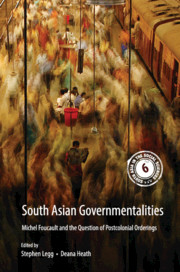Book contents
- Frontmatter
- Contents
- Acknowledgements
- Introductions
- Histories and Presents
- 3 Pastoral Care, the Reconstitution of Pastoral Power and the Creation of Disobedient Subjects under Colonialism
- 4 The Abiding Binary: The Social and the Political in Modern India
- 5 Colonial and Nationalist Truth Regimes: Empire, Europe and the Latter Foucault
- 6 Law as Economy/Economy as Governmentality: Convention, Corporation, Currency
- Subjects and Matters
- Reflection
- Contributors
- Index
6 - Law as Economy/Economy as Governmentality: Convention, Corporation, Currency
from Histories and Presents
Published online by Cambridge University Press: 28 October 2018
- Frontmatter
- Contents
- Acknowledgements
- Introductions
- Histories and Presents
- 3 Pastoral Care, the Reconstitution of Pastoral Power and the Creation of Disobedient Subjects under Colonialism
- 4 The Abiding Binary: The Social and the Political in Modern India
- 5 Colonial and Nationalist Truth Regimes: Empire, Europe and the Latter Foucault
- 6 Law as Economy/Economy as Governmentality: Convention, Corporation, Currency
- Subjects and Matters
- Reflection
- Contributors
- Index
Summary
We might say that today, especially in the United States, we are experiencing the painful effects of an orthodox faith in economy as universal law, that is, in the free market as the law of the universe, a cosmology so powerful that it claims authority over all forms of ethico–political agency, coding citizens as consumers, life as management and children as investments. The success of neoliberal visions of law and economy, or more accurately, law and economics, rests in their coding of law as a model for rational economic practice on the one hand, and on the other (rather more invisible) hand, the ability to institute that abstract, spectral thing that we call ‘the economy’ as the natural origin of law itself. If the presupposition of such approaches to law and economy is that these are distinct spheres and systems, we might say their telos lies in the hope that one day they will merge and become one, thus offering a powerful messianic vision of the meeting of desire (which is thought to motivate all self-interested economic transactions) and law, or a collapse of choice and coercion, in everyday conventions.
This utopian market vision evokes the imperial prophecy of Thomas Babington Macaulay, the first law member of the Governor-General's Council under the British East India Company and the motivating force for colonial India's Law Commissions, which installed its Criminal and Civil Procedure codes. In an influential speech in Parliament on the Government of India Bill in 1833, Macaulay argued that it ‘would be … far better for us that the people of India were well governed and independent of us, than ill governed and subject to us; that they were ruled by their own kings, but wearing our broadcloth, and working with our cutlery, than that they were performing their salaams to English magistrates … but were too ignorant to value or too poor to buy, English manufactures. To trade with civilized men is infinitely more profitable than to govern savages’ (Macaulay, 1967, 717–18). For utilitarians like Macaulay, the market itself offered the most efficient form of governing.
- Type
- Chapter
- Information
- South Asian GovernmentalitiesMichel Foucault and the Question of Postcolonial Orderings, pp. 134 - 159Publisher: Cambridge University PressPrint publication year: 2018

